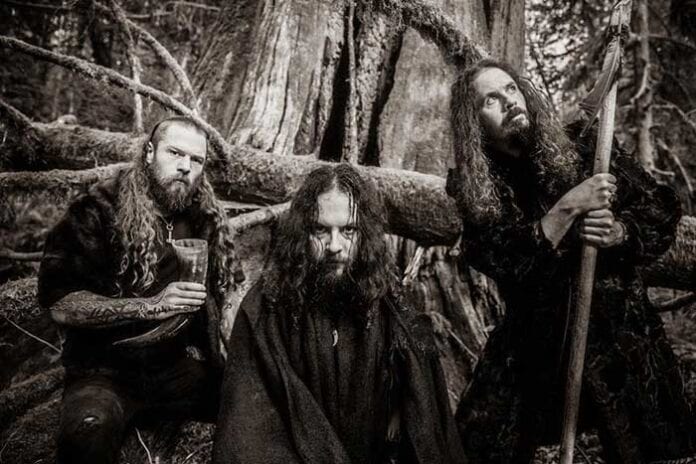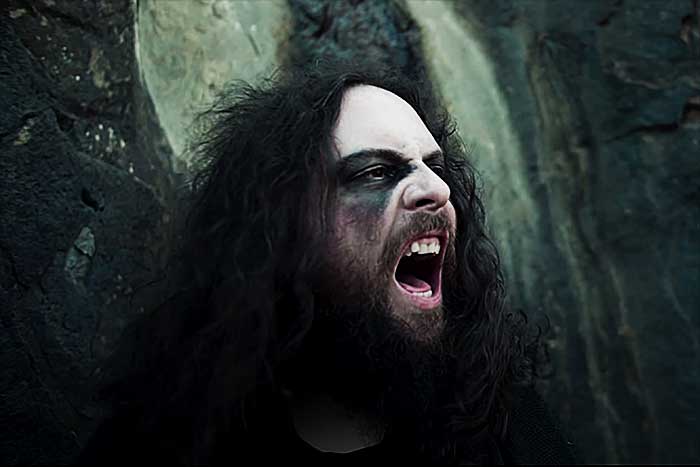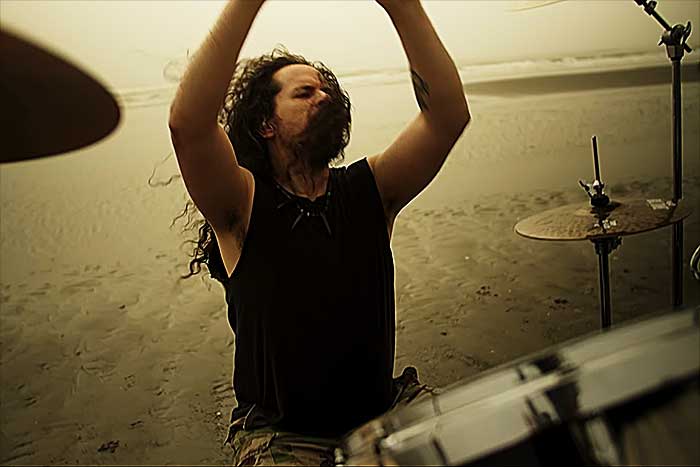
INTERVIEW WITH AARON WEAVER BY JOE DALY
PHOTOGRAPH BY DREAMING GOD
There was a time when the US black metal scene withered from the snide, frosted scorn of its corpse painted European brethren. And while metal will always have its trollish gatekeepers and self-styled purists, a steady siege of absorbing new releases over the past decade has revealed the USBM scene to be a fertile and innovative hotbed of new music. Atop the North American pantheon sits Washington’s Wolves In The Throne Room, whose mesmerizing blend of Norse black metal and gripping atmospherics has cast them as vanguards of modern metal. The band—Nathan Weaver (guitars, vocals), Aaron Weaver (drums, bass, synthesizers), and Kody Keyworth (guitars vocals)—has released Primordial Arcana, its seventh and most ambitious outing yet. We spoke with Aaron Weaver to discuss their experiences through the pandemic, the challenges they overcame on the new album, and the deep spiritual energies that flow throughout its music.
It looks like we’re entering Round 2 of the pandemic. How have you been holding up?
I know that a lot of people have been suffering a great deal, but this has been one of the best years of my life.
How so?
Just being forced by circumstances to slow down the pace of life. If the plague hadn’t occurred, this album would have come out a year ago. We would just now be coming home or still on the road in Europe, promoting the album on the European festival circuit. We’d be getting ready for another tour, probably some support slot in the States. Instead, due to circumstances, we’ve been able to slow down. We’ve had time to work on the record and improve a few aspects of the music that would not have otherwise been improved. We’ve had time as individuals to meditate, spend time in the woods, spend time with our families, and to really recharge ourselves, energetically and spiritually. When we do get back out on the road, we’ll be doing so with clear minds and strong bodies, and with a record that we’re super stoked about and really proud of.

This is your seventh full-length album and first where the band has handled all creative aspects. In addition to writing and performing the music, you produced and mixed Primordial Arcana yourselves. How does that feel, now that it’s all done?
It’s been excellent. It feels really good to be tapping into a new source of energy. It’s a new way of working that feels very fertile and like something that’s going to sustain us for many years to come. We’ve got so many ideas now, we could make another record tomorrow. And the fact that we’ve built our own studio and have the technical acumen to take the sounds and the concepts that are in our minds and hearts and transmit them into the music in a very effective and powerful way feels really good.
“MAKING A RECORD IS AN ACT OF SPIRITUAL OR ARTISTIC ENDURANCE. THIS RECORD IS NO DIFFERENT.”
In the past, you’ve said that creating albums has been a difficult process for the band. Was that true for the new album?
Yeah, it always is. I wish that it would be easy, but it never is. Speaking honestly, every artist that I’ve heard talk about the creative process—be it a musician, painter, sculptor, poet, or actor—refers to it as deep soul work. They go into the dark, unknown parts of the soul and psyche and rip it out from the depths. It’s painful. It’s taxing. It’s an ordeal. Climbing a mountain is an act of physical endurance. Making a record is an act of spiritual or artistic endurance. This record is no different.
How do you manage that kind of pressure in a way that allows your creativity to emerge?
Every record has its own flavor of agony. On this one, we really focused on the songwriting. We wanted the songwriting to be sharp and precise, so we didn’t allow ourselves any leeway. We wanted the riffs to be really strong and we wanted the arrangements to be really tight, without any fat. Sometimes we like to really expand and let a song become this open, psychedelic space that unfolds very slowly. That’s an approach that we appreciate and that we’ll always return to, but this album was very consciously reined in and more focused.
“I LIKE TEETERING ON THE POSSIBILITY OF COMPLETE FAILURE BECAUSE THAT’S WHERE THE MAGIC IS”
All great works of art carry some element of risk for the artist. Would you agree, and if so, what risk did the band confront in the new music?
Definitely. You hit the nail on the head. There was a specter in the room with us and that specter was that we’re a band who’s worked with a producer for a long time. Then it was like, “Okay, we’ve got this. We’ve got our new studio, we’ve got all these great ideas, and we’ve got all the time in the world.” But then you’ve got fucking Chinese Democracy. That’s the quintessence. Pantera did it. A lot of bands do it. They take that step, like the drummer thinks he can mix the record. It’s an archetypal thing and oftentimes it’s a complete failure. Sometimes it’s a big step down in terms of the sonic production of the record and a big step down in the feeling or energy of the music because the band actually doesn’t know how to produce a record. They don’t understand what a producer does, which is yes, a technical thing but it’s also a magical, energetic thing. They’re holding space for the record and willing it into being. Even though there was that risk of failing, I like being on that edge. I like teetering on the possibility of complete failure because that’s where the magic is, on the bleeding edge of what’s possible as an artist. At times we’ve certainly benefited from producers and engineers’ technical skill, but we know what the music is about in our hearts, and at this point, having been in the game for 20 years, we know how to transmit that feeling into a record in a way that makes sense to a listener.

Entering the writing process, what was your vision for the album?
It was a sound and a feeling, first off. Usually when we write a record, we start off writing down the overarching feeling of what we want the record to be. This time we had one particular image that stuck out to all of us. The image was of being in the high mountains, above the tree line, at the edge of the glaciers in the Cascades or Olympics, which are our home mountain ranges, and drinking the water right off the glacier, where it melts and becomes a stream that becomes a river and flows to the ocean—drinking it right at the source. That water, right at the source, is magic. It’s so cold and so pure, and it fills your body with this vitality and power. It was that feeling and essence that we wanted to weave throughout the record.
“IT’S SO COLD AND SO PURE, AND IT FILLS YOUR BODY WITH THIS VITALITY AND POWER.”
Your music has always held a tight connection to the natural world. Primordial Arcana explores those themes, but there also seems to be something even further back. Is there a cosmological theme at play, as well?
Yes, 100 percent. It’s alchemy. It’s the infinite. Our practice of connection to that is through the forest—our forest. The ancient people are born into connection and reverence of being in connection with the spirits and the landscape and the plants and the animals. As modern western people, we don’t have that. We’re born into the world we’re born into, and it’s my personal work to begin to do some psychic repair work—with great respect, to slowly and humbly grow a relationship with this place. How can I begin to connect in a good way and learn how to be a person who is a good citizen of this place?

Do you see black metal as a vehicle for accessing the spiritual realm?
Yes. There are lineages. You can enter the Buddhist wisdom stream or you might find a teacher in some lineage of knowledge going way, way back that doesn’t have a formal name. In black metal, we found something, not all of it—not in the spikes or the corpse paint or the glorification of Satan and the blood and the guts and what have you, but in something else that’s in there. When I heard Ulver for the first time, for instance, I felt that it was music that was coming out of the landscape. The endless winter, the midnight sun, the summer solstice, the fjords and forests, I realized I could use that same method. It’s like a style of painting or a martial art—black metal versus techno. It’s like, what method do you use to do this work? Black metal has worked for us over the years, especially culturally, coming out of this DIY, punk, and crust background, which is very secular and materialistic in many ways, and we were just ready to work in the realms of spirit. Black metal was and is the tool that works for us.
“THE PROCESSES OF THE COSMOS ARE NO DIFFERENT THAN THE PROCESSES OF YOUR OWN SOUL—THEY ARE THE SAME AND THEY’RE DIFFERENT. THAT’S THE MYSTERY OF NON-DUAL AWARENESS.”
“Primal Chasm” addresses the age-old maxim, “As above, so below,” which has numerous connotations. What does it mean to you?
Kody and I really resonate with alchemical imagery—the European tradition of alchemy, which is the closest thing we have as a western wisdom tradition, I think. In my mind, it’s a meditation practice. It’s a set of spiritual technologies or imagery systems or iconographies that allow for the possibility of inward journey. “As above, so below” most strongly evokes for me the idea that the outside is no different from the inside. The processes of the cosmos are no different than the processes of your own soul—they are the same and they’re different. That’s the mystery of non-dual awareness. I’m clearly me and you’re clearly you and that’s clearly a star, but at the same time, in a different level of consciousness, it’s a unified field. Maybe that’s the field of art and magic and the world of spirit. I think that all successful art has to move within that world, whether it’s explicit or implicit. We’re not talking about things that can be quantified or that can be understood through a materialistic viewpoint. It’s a mystery. There’s no end to it, there’s no answer to it, and there’s not one perspective. It’s an infinitely faceted jewel.
“Masters of Rain and Storm” is long and epic journey with many different parts. What’s happening in there?
The songwriting on this album is so focused, and the songs came out so much shorter than we’d done before. “Masters of Rain and Storm” was a song that wanted to expand and take a lot more space. In some ways, it’s the most epic and grand of the songs on this record, which makes sense because it’s a song that is very much about the mountains and the spirits of the mountains, which are very grand and powerful spirits. In the high mountains, there’s a feeling you get—a power and a divinity that’s very different from what you’d experience in a lowland forest. It’s just stronger, reaching towards the heavens when the thunder and lightning are exploding in the high mountains. So, that song is tapping into that.
“IN THE HIGH MOUNTAINS, THERE’S A FEELING YOU GET—A POWER AND A DIVINITY THAT’S VERY DIFFERENT FROM WHAT YOU’D EXPERIENCE IN A LOWLAND FOREST.”
What are some of your non-metal influences lately?
One of my biggest influences has been the writer Gary Snyder. He was adjacent to the Beat Generation. I think he even appears in On the Road, not as himself but as a different character. He’s from the Pacific Midwest and grew up here, working in the forests and the logging industry in the 50s. He was a part of the early Zen community in Northern California, and he writes about wilderness and Zen and magic and a lot of things that I’ve tried to weave into my life and my art. Last night I was reading a compilation of essays by him called The Practice of the Wild. Anyone who lives on the West Coast should definitely read it. In my mind, he’s a guru of consciousness. A lot of the ideas that we hold to be self-evident came through Gary Snyder from other wisdom sources like Tibetan Buddhism, Zen, occultism, etc. In the world of visual arts, my biggest influence on this record was Rembrandt and the Dutch Masters. Their use of black and the contrast with things that are illuminated was the picture in my mind for mixing. I wanted the mix to look like a Rembrandt painting—my synesthesia experience. That’s one of the reasons that the cover is a still life. We wanted to evoke the feeling of a Dutch still life.
What’s next for Wolves In The Throne Room?
We made the decision to not go to Europe. Well, our booking agent made the decision. He was saying for months that it would go on, but we weren’t sure. Finally he said, “Yeah, you’re right, it’s not going to happen.” So, we’ve got some extra time and we plan on doing some recording. I think we’ll record an EP this winter. The studio is the best place to be in the winter. When it’s dumping rain outside, cold and dark for months at a time, doing music at home by a warm fire is one of my favorite places to be, so that’s what we’ll be doing.




















